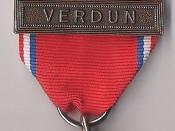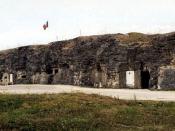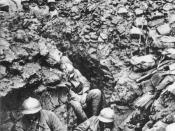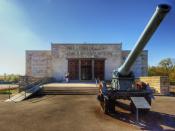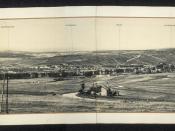Describe the causes, events and consequences of the Battle of Verdun.
The Battle of Verdun, fought between German and French forces was one of the major devastating engagements of the First World War. It was fought for ten months, from February to December 1916. The battle of Verdun is considered by historians one of the lengthiest battles in world history, involving a vast amount of men on such a small piece of land. This provides an explanation for its common reference as ?the battlefield with the highest density of dead per square yard. The battle of Verdun was the cause of some of the most brutal events of World War One, which is an extremely depressing fact as all that was gained was a tremendous loss of life, instead of strategic advantages from either side, France or Britain. A variety of causes can be found when trying to explain why the Battle of Verdun broke out in February of 1916.
Whether it was the parties? views on the battle or General Erich von Falkenhayn?s plan, German motives give such explanation.
In 1916, both parties, the Germans and the Allies were convinced that the time had come for them to achieve their great victory. Being greatly convinced of their success, Germany attacked France at Verdun and later the allies interfered to help relieve France at Verdun in the Battle of the Somme.
General Erich von Falkenhayn considered England Germany?s most important ally but to defeat England, they knew they had to first weaken France considerably. A target had to be found, according to Falkenhayn?s plan, which was of such importance to the French that they would involve all troops to prevent the loss of this target. German General Erich von Falkenhayn believed in a strategy of attrition and argued that Germany should bleed France to death by choosing a point of attack ?for the retention of which the French would be compelled to throw in every man they have.? This point of attack had to be Verdun as it was an important part in the line of defense and the Northern gate to Champagne. Germany?s aim was to not only defeat the French, but to break their spirits completely.
In defeating the French, Germany also saw the Battle of Verdun as a chance to take control of the city Verdun and with this capture obtain greater power over the French. This again would make their plan to defeat England a lot simpler.
With these goals in mind, Germany first attacked the French on the 21st of February 1916 with intensive artillery bombardment on the forts surrounding Verdun. France immediately retreated to its predetermined positions while the strong German army made its way through French lines, disregarding the enormous loss of life. At the same time, General J. Joffre assigned General Henri Phillipe Petain to be in charge of the French troops at Verdun. Joffre was the French commander and Chief whishing to end further retreat on the French side, while Petain fought with just a single motto. This motto was ?Ils passeront pas!? which when translated to English means ?They shall not pass?. General Henri Phillpe Petain restructured his troops and transported supplies to Verdun which allowed his men to meet the unceasing attacks of the Germans with increasing confidence. On March 6th 1916 the German commanders ordered another attack and soon after, on March 22ond 1916 the German forces captured another French fort, Fort Harcourt, not far from Verdun. This was not all, soon after, on March 26 another Fort close to Verdun called Malancourt was won by the Germans. Even though these were unfortunate events for the French, the French confidence stayed with them and the initial German drive had failed. It is interesting to see that Germany had taken in possession three forts, all within short distance of Verdun, but they had not managed to surrender Verdun itself, and it remained undefeated. By April, German attacks continued, however with little intermission. France developed an Air Force which would serve as a protection to Verdun and be of great help to the French who tried to secure Verdun as much as possible. Not only this, it also served as a big advantage to the French as it gave control of the skies over the battlefield and this again played an important role in the successful defense of the area. In June a new German drive managed to capture the forts of Vaux and Thiaumon. Soon however, the pressure started to become less and less. The reason behind this is found in the British attack on the Germans at the river Somme to disperse their military strength and thus relieve the strain on French troops. This and another Russian offensive forced Germans to take some of its troops away from Verdun As the fighting began to cease, the French troops prepared for an abrupt and smashing blow north of Verdun. On September 26th 1916, French troops under the control of General Charles Mangin advanced on a 6 km front, enabling them to recapture Douaumont and Thiaumont. This recapture destroyed the last hope possessed by Germany to turn the allied line at Verdun. French attacks continued throughout October 1916, allowing France to regain Fort Vaux, which was evacuated by the Germans in November. In general, as French attacks persisted, they managed to take back all that they were robbed of in February of the same year. Losses on both sides were tremendous with 350 000 French casualties and 330 000 German casualties. The battle itself was completely indecisive as no strategic gains or advantages were achieved from either side, the French or the Germans. When analyzing the consequences of the Battle of Verdun it becomes clear that Germany achieved more or less the opposite of what they had expected to achieve. They had exhausted a great percentage of their best troops and much of their supplies, which would have been important and useful to them in other areas. Hindenburg later says when refereeing to Verdun that ?the Battle of Verdun exhausted our forces like a wound that never heals.? None of the objectives fixed were reached, neither the occupation of the city, nor the destruction of the French army as losses are just as high on both sides. At the end of the year German armies were worn out while French at Verdun have shown strategists as general Petain the defender, saving the life of his soldiers. For France the battle of Verdun was a strategic and psychological victory, which crowned them with victory and prestige. It is as the historian Mr. Gillet wrote in reference to this battle, ?At Verdun, France learned to know herself. The Marne was not enough to show France what she really was.? For France this battle was, besides the loss of life a heroic exploit in which all shared alike. In consequence this battle also portrays the result of two industrialized countries fighting an industrial war against each other. There were 1 000 000 casualties on both sides, 700 000 deaths and a great deal of bodies which were never found as they were blown into bits by artillery shells or gassed to death. In conclusion, The Battle of Verdun, by many historians called the ?worst battle of attrition in world history?, was indeed one of the most terrible battles ever fought which absolutely no achievements from either side. The loss of lives was a catastrophe and from a strategic point of view there can be no justification for these atrocious losses. The battle, first fought to defeat the French, degenerated into a matter of prestige and pride of two nations literally for the sake of fighting. Sadly, its goal towards the end was not to conquer a city or a piece of land, or even power over another nation like many other battles are being fought for. Its only goal was to produce as many deaths as possible.
